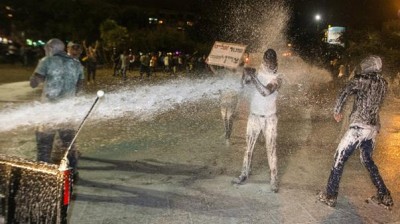Police Attack Demonstration Against Police Violence in Israel

A massive protest in Tel Aviv by Ethiopian Jews against racism and police violence was attacked by police with horse charges, water cannon and baton rounds.
Sunday’s protest was sparked by video footage of police officers beating an Ethiopian-Israeli soldier, Damas Pakedeh, without provocation. Two officers have since been suspended on suspicion of using excessive force. Pakedeh is pushed, kneed and punched, and at one point an officer threatens to draw his gun.
Thousands took part in the protest rally, with many comparing Israeli police actions to police brutality in the United States. The rally began at the Azrieli Center at 3 p.m., after which a march to the Ayalon highway ended in a blockade that halted all traffic.
Later that night, some demonstrators tried to storm the city’s municipal building, and police fired water cannon, tear gas and stun grenades, employing mounted police charges against protesters who threw bottles and bricks. Stun grenades are usually reserved for use against Palestinians. Forty-three people were arrested and a reported 56 police and at least a dozen protesters were hurt.
On Monday, Israeli Prime Minister Benjamin Netanyahu met with Pakedeh in a hypocritical gesture towards recognising the grievances of Israeli citizens of North African origin. In a deeply cynical exercise in damage control, Netanyahu was filmed embracing Pakedeh, expressing shock at his treatment and praising him as “an excellent student,” for doing “volunteering on the weekend,” etc. He then met Ethiopian Israeli leaders, after which he declared, “We must stand together as one against the phenomenon of racism, to denounce it and eliminate it.”
Police have threatened a clampdown on any future protests, though smaller demonstrations began in Jerusalem last night. Yesterday, the Tel Aviv Magistrate’s Court extended the remand of 15 of the protesters, three for 48 hours and 12 for 24 hours. Four demonstrators were released on probation provided that they stay out of Tel Aviv.
At an earlier protest last Thursday, Ethiopian Jews were attacked by police using water cannon outside Netanyahu’s residence, with at least 13 people injured.
Many Ethiopian Jews were airlifted into Israel in 1984 and 1990, at a time of civil war and famine, in a propaganda exercise, after a rabbinical ruling that they were direct descendants of the biblical Jewish Dan tribe. But the 135,500-strong community, many second-generation, has suffered racial discrimination and poverty ever since.
Israel has the second highest poverty rate in the developed world, with nearly 25 percent of its eight million citizens living below the poverty line. Jewish Israelis who came from the Middle East and North Africa—the Mizrahim—are hit particularly hard, earning 40 percent less than their European counterparts, doing less well in school, and less likely to go on to college or university.
Ethiopian households earn 35 percent less than the national average, more than half live below the poverty line, and only half of young people receive high school diplomas, compared with 63 percent nationally. Many are employed on one-year contracts without social security, before being sacked and rehired.
Immediately following the first major wave of immigration in the mid-1980s, the Chief Rabbinate, after recognizing them as Jews, insisted that Ethiopians undergo a symbolic immersion ceremony to confirm their Jewishness, sparking protests. Descendants of Ethiopian Jews forced to convert to Christianity are required to undergo actual conversion to be eligible for citizenship.
In 2012, a decision by 120 homeowners not to sell or rent their apartments to Israeli-Ethiopian families provoked widespread protests in the southern city of Kiryat Malakhi.
Racist protests in Tel Aviv’s impoverished suburbs that year resulted in dozens of asylum seekers being injured, after a rally in which Miri Regev of Likud described asylum seekers as a “cancer in our body”. Demonstrators attacked shops, properties and cars belonging to the migrants and beat up men and women.
The revelation that Israeli hospitals secretly dumped blood donations from Ethiopian immigrants, citing fears of HIV infection, caused widespread outrage. Moreover, in 2013, Israeli authorities admitted to having administered birth control injections to Ethiopian Jewish women either without their consent or knowledge or through active coercion.
In January 2014, thousands of African asylum seekers marched to Rabin Square to protest measures restricting their freedom of movement, ability to work and long delays in processing refugee applications and demanding official refugee status.
President Reuven Rivlin spoke of the need to address “an open and raw wound at the heart of Israeli society,” but only while not allowing “a handful of violent troublemakers to drown out the legitimate voices of protest.”
Officers were deployed in large numbers on Monday around Jerusalem’s government complex, in anticipation of another outbreak of violence, though no demonstration materialised. Ha’aretz noted certain important features of Sunday’s protest that point to the growing alienation of young Ethiopian Israelis.
Just over 40 percent now attend state religious schools, down from 76 percent for their parents’ generation. The growth of secularism and oppositional sentiment was evidenced by how,
“Plainly defying the religious laws of modesty that are widely accepted in the community, many of the young women sported snug-fitting jeans and very short skirts. And there were also many bareheaded young men among the protesters, more than a few sporting dreadlocks.”

